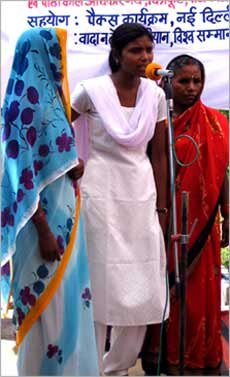Employment To All: Uttar Pradesh
 The passage of the National Rural Employment Guarantee Act (NREGA) by the India’s Parliament came into force from 2nd February 2006, after intense mobilization by the civil society and people’s movement, including the massive Rally by the National Conference of Dalit Organisations (NACDOR) at Delhi’s Ramlila Ground from 4th to 6th December 2004, demanding the right to employment and eliminating hunger and poverty. The Act provided to the poorest in the 200 districts of India a guaranteed employment for 100 days. Special provisions were made to provide employment to Dalit, indigenous groups, minorities, women and disabled, allowance in the absence of employment, provision of work within 15 days, crèche for the children and so on.
The passage of the National Rural Employment Guarantee Act (NREGA) by the India’s Parliament came into force from 2nd February 2006, after intense mobilization by the civil society and people’s movement, including the massive Rally by the National Conference of Dalit Organisations (NACDOR) at Delhi’s Ramlila Ground from 4th to 6th December 2004, demanding the right to employment and eliminating hunger and poverty. The Act provided to the poorest in the 200 districts of India a guaranteed employment for 100 days. Special provisions were made to provide employment to Dalit, indigenous groups, minorities, women and disabled, allowance in the absence of employment, provision of work within 15 days, crèche for the children and so on.
However, Government in Uttar Pradesh was unwilling to implement the Law. The then Uttar Pradesh Government viewed it as a programme of the then ruling party at the Centre. In 22 districts of Uttar Pradesh, then covered under the NREGA, the registration of the households, issuing of job cards, funds release, planning etc was not undertaken properly. The district planning committees did not exist in the State at all. While the poor, especially the Scheduled Castes, Scheduled Tribes and Most Backward Classes had received the law with enthusiasm and hope, the hope belied at the face of this callous and unconcerned attitude of the state government and its agencies. The Government even attempted to decry, discredit, and eventually dismantle this hard-won entitlement.
With a resolve to initiate a campaign on Peoples’ Rights to Employment and work with dignity under the NREGA and to draw on experiences with the social audit or people’s audit process elsewhere, the National Conference (now Confederation) of Dalit Organisations (NACDOR) took the initiative to form an alliance with a number of groups and organized the ‘Rozgar Adhikar Yatra’ in Uttar Pradesh. As a massive mass awareness campaign, this Rozgar Adhikar Yatra began on 20 June 2006 from village Madawara in district Lalitpur of Bundelkhand region; on 23rd June from Palia in Terai Region in district Kheri; on 24 June at Kushinagar in Poorvanchal or Eastern Uttar Pradesh; and on 25 June from Sonbhadra. All these Yatras traveled about 4000 kilometers before culminating at Lucknow in a Massive Rally for Rozgar on 2 July 2006. The Rozgar Adhikar Yatra covered all 22 districts notified under the NREGA in the State.
The objective of Rozgar Adhikar Yatra was to establish the entitlements that people have under the NREGA (now MNREGA), and fight manipulation, negligence and corruption of the delivery machinery and vested interests.
The Rozgar Adhikar Yatra demonstrated that the peoples’ power and mass mobilization could achieve the rights of the people in constitutional and peaceful action not just in small pockets, but in the entire state.
Madhya Pradesh
Following the success of the Rozgar Adhikar Yatra in Uttar Pradesh, NACDOR in collaboration with Poorest Area Society Programme, Wada Na Todo Abhiyaan, and several local organizations organized Rozgar Adhikar Yatra in Madhya Pradesh in two phases covering the notified 18 districts of MP. In the first phase from 16th to 19th October, the Rozgar Adhikar Yatra covered the districts of Shahdol, Tikamgarh, Balaghat, Siddhi, Shivpuri, Satna, Dhar, Shaupur and Chatarpur. In second phase from 24th to 31st of October 2006 the Rozgar Adhikar Yatra covered the districts of Baitul, Dindori, Nimad, Jhabua, Mandala, Khargaon, Badawani, and Umaria.

As in Uttar Pradesh, the Rozgar Adhikar Yatra concluded in a massive public meeting and rally attended by more than 5000 people coming from 18 districts on 31st October 2006. People mobilized by various organization and villages including Dalits, Muslims, indigenous people, Adivasis, women and physically challenged asserted for their rights and called for redressing their problems.
After the rally a delegation met with Chief Minister and delivered a memorandum regarding the suggestions for effective implementation of NREGA and demanded immediate measures for ensuring proper implementation of NREGA, training of the Panchayat representatives in implementing government schemes, training of the elected Dalit, Adivasi representatives ,provision of allowance in absence of jobs and other provisions of the NREGA.

